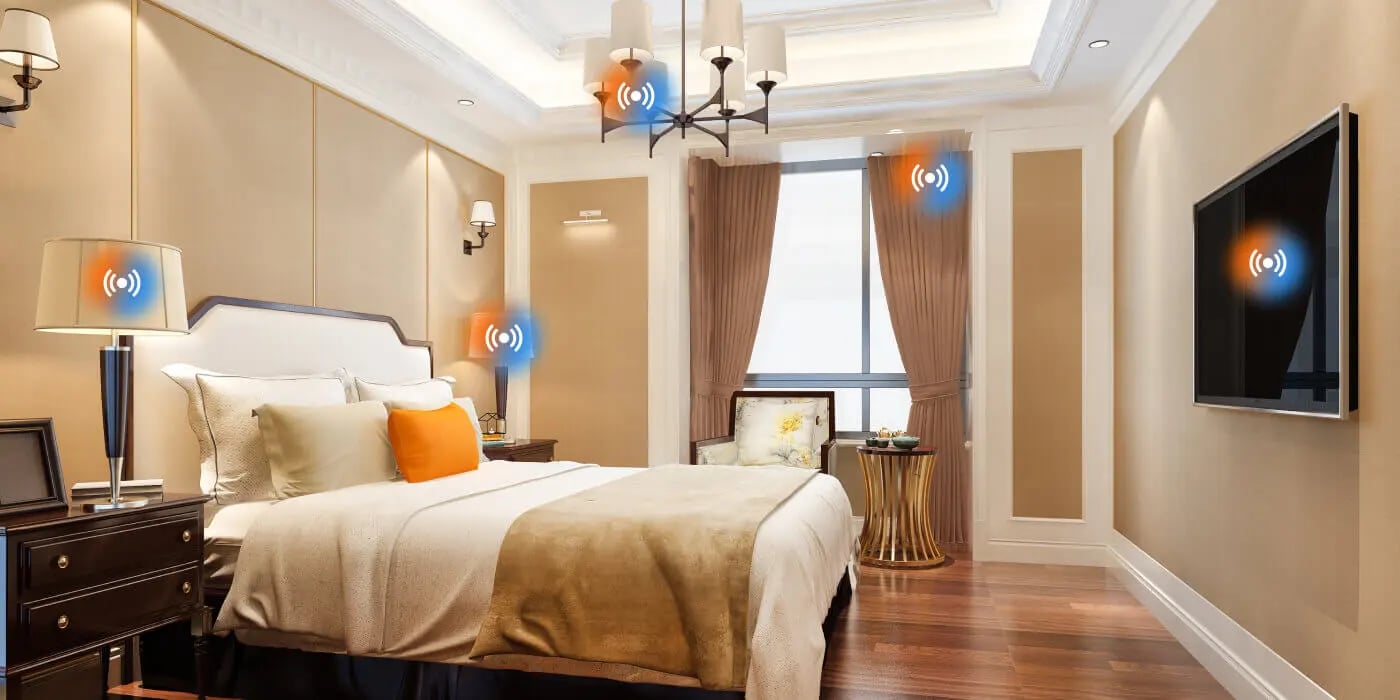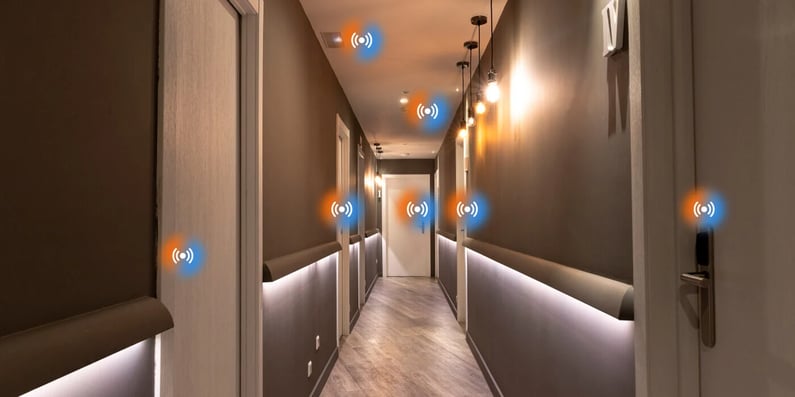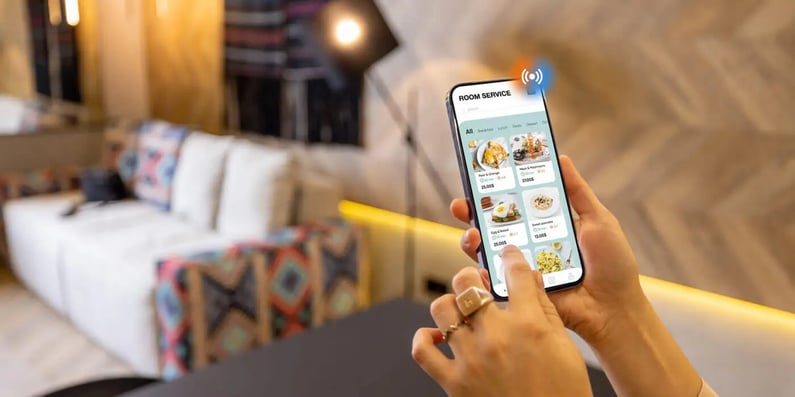The hospitality sector has been greatly influenced by the Internet of Things (IoT), leading to improved guest experiences, streamlined hotel management operations, and increased efficiency. Smart locks, smart sensors, and hotel apps are just a few examples of the IoT technology that has brought about this transformative change.
In this blog post, we will delve into some key areas where IoT is making a significant impact.
Smart Hotel Room Management
With the power of IoT, guests can effortlessly take charge of their hotel rooms using their smartphones or voice commands. From fine-tuning the lighting to achieving the perfect room temperature, and even adjusting the curtains to their desired position, this level of control puts the guest in the driver's seat of their own personalized oasis.
Guests also have the seamless capability to effortlessly control and customize their entertainment experience. From their connected devices, they can manage television channels, audio systems, and even streaming services. This level of control and personalization enhances the overall guest experience, making it more tailored to their unique needs and preferences.
Furthermore, the IoT-powered smart room management system not only allows guests to personalize their rooms but also provides a seamless experience when it comes to requesting various services. Whether it's ordering room service, booking spa treatments, or even scheduling wake-up calls, guests can easily make these requests through their connected devices. This eliminates the need for phone calls or physical interaction with hotel staff, making the entire process more convenient and hassle-free.

Energy and Resource Management
Hotels are harnessing the power of IoT smart building sensors and systems to revolutionize how they optimize energy consumption. By seamlessly connecting a network of devices, hotels can automate and intelligently adjust their lighting and HVAC systems based on occupancy levels. This groundbreaking technology leads to substantial energy savings, as resources are only utilized when rooms are occupied, eliminating any wastage when they are empty.
By utilizing occupancy sensors, lighting systems can automatically adjust or turn off when not in use, resulting in a significant reduction in electricity usage. Additionally, HVAC systems can be fine-tuned to maintain optimal room comfort while conserving energy during periods of vacancy.
Beyond energy management, IoT-based solutions offer hotels the ability to effectively manage water resources. By integrating smart water management systems with IoT sensors, hotels can monitor water usage in real-time throughout their premises. This proactive approach allows for the identification of issues such as leaks or excessive water consumption, prompting immediate action to prevent water loss and conserve vital resources.
The advantages of implementing IoT-enabled energy and resource management in hotels go beyond financial savings and ecological sustainability. By embracing these technologies, hotels can enhance their image as environmentally friendly establishments, attracting guests who prioritize sustainable accommodation options.
Asset Tracking and Management
Hotels are now empowered to efficiently track and manage their assets with the help of IoT. This innovative technology allows hotels to effortlessly locate and monitor a wide range of items, including linens, furniture, equipment, and food inventory, in real time.
By implementing IoT-enabled asset tracking systems, hotels empower their staff with the ability to effortlessly monitor and manage their inventory. Equipping assets with IoT sensors allows for seamless tracking of their movement throughout the premises, eliminating the need for time-consuming searches for misplaced linens or equipment. With IoT technology, hotels can instantly locate any asset within their property, saving precious time and resources.
Furthermore, IoT-driven asset tracking greatly contributes to inventory management by reducing losses and preventing theft. By keeping a constant eye on valuable assets, hotels can detect and deter any unauthorized movements or misuse. In the case of expensive equipment, IoT sensors can be programmed to trigger alerts when they are taken outside specified areas, thus strengthening security and preventing theft.
Enhanced Security and Safety
The implementation of IoT technology in hotels has revolutionized security measures, ensuring the safety of both guests and staff. A key aspect of this transformation is the integration of smart locks, surveillance cameras, and access control systems throughout the premises.
Smart door locks have replaced traditional key-based with IoT-enabled locks that operate via wireless protocols. These locks can be remotely controlled and monitored by hotel management, providing them with centralized access control. This eliminates the need for physical keys and allows for efficient management of guest room access.
Surveillance cameras integrated with IoT capability add an extra layer of security. They continuously monitor various areas of the hotel, both indoors and outdoors.
These cameras have special features like facial recognition and motion detection. Their ability to analyze allows them to find unusual activities or potential threats. The real-time monitoring capabilities help hotel staff identify and address any suspicious behavior promptly.
IoT smart sensors also play a crucial role in ensuring the safety of guests and employees. They detect hazardous conditions such as smoke, fires, gas leaks, or even unusual temperature variations. If a danger is found, the hotel staff gets alerts and can quickly evacuate guests if needed. This proactive approach significantly minimizes the risk of accidents and enhances the overall safety of the hotel environment.
They can also be used to increase the operational safety of hotel staff. Wearable devices offer real-time tracking and monitoring features. This enables hotel management to keep a constant eye on staff members and respond swiftly in case of emergencies or accidents. These devices help janitors and housekeepers feel safe and confident while working, even in remote areas.

Personalized Guest Services
The hospitality industry has changed how it serves guests in the era of the Internet of Things. Hotels can gather data about guest preferences by using IoT devices that work together smoothly. This data includes preferred room temperature, dietary needs, entertainment preferences, time spent at hotel facilities, and use of amenities.
Utilizing this wealth of data, hotels can then tailor their services to each individual guest, ensuring a unique and unforgettable stay. One way to achieve this personalization is by recommending nearby attractions based on guests' specific interests. Smart devices can analyze visitors' preferences and suggest nearby attractions or events for history, nature, or art enthusiasts. This allows guests to fully utilize their time when exploring a new city or region.
Moreover, hotels can leverage IoT technology to provide customized promotions to each guest. Analysis of their spending patterns, preferences, and previous interactions, allows them to create targeted offers and discounts.
IoT devices can even suggest services or amenities based on guests' previous interactions. For example, if a guest frequently visits the hotel gym or makes use of the business center, the IoT system can send personalized recommendations and reminders for upcoming fitness classes or networking events. By proactively anticipating guests' needs and preferences, hotels can create a more customized and convenient experience, ensuring ultimate satisfaction and loyalty.
Seamless Guest Communication
Businesses in the hotel sector can now use IoT to improve communication with guests, making their experience better.
The implementation of smart hotel apps or voice assistants has become commonplace in many establishments. These innovative tools serve as a bridge, facilitating instant information exchange between guests and hotel staff. Guests can ask about their stay, such as check-in and check-out procedures, hotel policies, local attractions, and much more.
These apps or voice assistants use their databases to provide guests with quick and accurate responses. They ensure that guests have the required information immediately.
These apps excel in addressing guest queries. Old ways of communicating, like waiting at the front desk or calling, are being replaced by easier IoT-powered solutions. Guests can simply use voice commands or mobile interfaces to access various information, ranging from restaurant recommendations to transportation services. This expedites the process for guests and minimizes potential frustrations, leading to increased guest satisfaction.
Another significant advantage is the ability to streamline room service requests. Guests can make orders using the app or voice assistant, avoiding phone calls and language barriers. With the introduction of IoT technology, hotels simplify the ordering of room services or housekeeping services for their guests

Data Analytics and Insights
Utilizing IoT technology, hotels have the ability to gather and analyze vast amounts of data about their operations and the behavior of their customers. These insights can be used to drive business growth and enhance the overall guest experience.
Having this data can optimize hotel operations, leading to increased profitability and streamlined workflows. Based on analyzed data, hotels can identify areas that require improvement, such as energy consumption patterns or room cleaning schedules.
By optimizing these operations, hotels can minimize operational costs, reduce waste, and enhance overall efficiency. For example, hotels can adjust cleaning times if most guests check out between 11am and 1pm. This allows them to prepare the rooms more quickly. As a result, hotels can accommodate more guests and generate more revenue.
Making data-driven decisions based on the insights gained from data analytics is another significant advantage of leveraging IoT in the hotel industry. Through the utilization of sophisticated algorithms and machine learning techniques, hotels can make informed decisions regarding pricing strategies, marketing campaigns, and resource allocation, among others. By interpreting historical data, hotels can predict future trends, demand patterns, and market fluctuations, enabling them to proactively respond to changes and stay ahead in a competitive marketplace.
Enhanced Guest Safety and Health
Hotels have embraced the power of the Internet of Things (IoT) to completely transform their operations and prioritize the safety and well-being of their guests. Through the implementation of contactless technology, hotels are now able to offer a seamless experience for guests during check-ins, payments, and interactions with staff. With the simple use of smartphones or smart devices, guests can effortlessly complete these processes, enhancing convenience and peace of mind.
Moreover, IoT enables hotels to enhance guest safety by implementing sensor-based technologies. These advanced sensors can constantly monitor air quality, ensuring that guests are breathing clean and pure air throughout their stay. This technology not only improves the overall guest experience but also aids in the prevention of respiratory issues caused by poor indoor air quality.
Furthermore, these sensors can also detect allergens in the environment. By constantly monitoring the presence of allergens, hotels can take immediate actions to mitigate their impact, making the hotel a safe haven for guests with allergies. Whether it is pollen, dust mites, or any other common allergens, hotels can ensure that their guests are provided with an environment that promotes their well-being and comfort.
In addition to air quality and allergen detection, IoT can be harnessed to guarantee food safety within hotels. By integrating sensors into various parts of the food supply chain, hotels can monitor factors such as temperature, humidity, and storage conditions. These real-time monitoring systems can instantly alert hotel staff if any parameters fall outside the safe range, ensuring that all food served to guests is of the highest standards and free from any potential health hazards.
The integration of IoT in the hospitality industry provides numerous benefits, including improved guest experiences, operational efficiency, cost savings, and sustainable practices. As technology continues to advance, we can expect to see further innovations in this sector.
POND IoT's Cellular Connectivity for Hotels
Our SMART SIM improves network signal availability, even in remote areas or regions with limited coverage. They can be used for various devices around the hotel, including smart lighting systems, security systems, wireless payment terminals (POS), etc.
POND's SIM card has built-in redundancy thanks to the coverage from the largest providers in the US on a single profile. In the event that one network goes down, the SIM will switch to the strongest available network, keeping devices online and hotel operations running.
Contact us to learn more about our solution.

